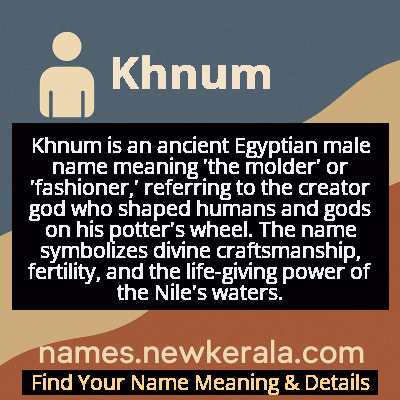Khnum Name Meaning & Details
Origin, Popularity, Numerology Analysis & Name Meaning of Khnum
Discover the origin, meaning, and cultural significance of the name KHNUM. Delve into its historical roots and explore the lasting impact it has had on communities and traditions.
Name
Khnum
Gender
Male
Origin
Egyptian
Lucky Number
4
Meaning of the Name - Khnum
Khnum is an ancient Egyptian male name meaning 'the molder' or 'fashioner,' referring to the creator god who shaped humans and gods on his potter's wheel. The name symbolizes divine craftsmanship, fertility, and the life-giving power of the Nile's waters.
Khnum - Complete Numerology Analysis
Your Numerology Number
Based on Pythagorean Numerology System
Ruling Planet
Uranus (Rahu)
Positive Nature
Strong sense of order, loyal, practical, and disciplined.
Negative Traits
Stubborn, overly serious, rigid, and prone to feeling restricted.
Lucky Colours
Blue, gray.
Lucky Days
Saturday.
Lucky Stones
Blue sapphire.
Harmony Numbers
1, 7, 8.
Best Suited Professions
Managers, engineers, accountants, organizers.
What People Like About You
Dependability, discipline, practicality.
Famous People Named Khnum
Khnum
Ancient Egyptian deity
Creator god who fashioned humans on his potter's wheel, guardian of the Nile's source
Khnum-hotep
Ancient Egyptian noble and official
Governor of the Oryx nome, known for his elaborate tomb at Beni Hasan
Khnum-ib-re
Ancient Egyptian priest
High priest of Khnum at Elephantine, known from temple inscriptions
Name Variations & International Equivalents
Click on blue names to explore their detailed meanings. Gray names with will be available soon.
Cultural & Historical Significance
As a creator deity, Khnum was often depicted as a ram-headed man, symbolizing fertility and creative power. His cult centers at Elephantine and Esna remained active for over three millennia, demonstrating his lasting importance in Egyptian religious life. Khnum represented the concept of divine craftsmanship and the fundamental creative forces that sustained the universe, making him integral to Egyptian understanding of creation and cosmic order. In later periods, he was syncretized with other gods like Ra, becoming Khnum-Ra, which expanded his solar associations and reinforced his role as a reborn sun deity.
Extended Personality Analysis
Individuals named Khnum are often perceived as possessing creative, nurturing, and foundational qualities, reflecting the deity's mythological attributes. They tend to be methodical builders and creators who approach life with careful planning and craftsmanship, much like the god shaping beings on his potter's wheel. There's often a strong sense of responsibility and protective instinct, mirroring Khnum's role as guardian of the Nile's life-giving waters. These individuals typically exhibit patience and persistence, understanding that meaningful creation requires time and careful attention to detail.
The name suggests someone who is both practical and visionary, capable of turning abstract ideas into tangible reality. They may demonstrate a deep connection to tradition and heritage while simultaneously embracing innovation and new beginnings. The combination of creative vision with practical implementation makes them natural leaders in projects requiring both imagination and structural integrity. Their personality often reflects the ram symbolism—determined, protective of their 'flock' or community, and possessing natural authority that comes from competence rather than aggression.
Modern Usage & Popularity
In contemporary times, Khnum remains primarily used within Egyptian and Coptic communities as a traditional given name, though it has gained some popularity among enthusiasts of ancient Egyptian culture worldwide. The name sees occasional use in academic circles and among families seeking unique mythological names with deep historical roots. While not common in Western naming conventions, it appears in diaspora communities and among parents interested in Afrocentric names. Its usage has seen a slight increase with growing interest in ancient Egyptian spirituality and the New Age movement, though it remains quite rare compared to more mainstream Egyptian names like Ra or Anubis. The name maintains a niche but meaningful presence, often chosen for its powerful mythological associations and distinctive sound rather than contemporary popularity trends.
Symbolic & Spiritual Meanings
Khnum symbolizes creation, fertility, and the fundamental building blocks of existence. As the divine potter, he represents the transformative power of shaping raw materials into living beings, embodying the concept of purposeful creation where intention meets material form. The ram-headed imagery connects him to strength, leadership, and virility, while his association with the Nile positions him as a symbol of life-sustaining abundance and cyclical renewal. Khnum embodies the marriage of artistic creativity with practical craftsmanship, suggesting that true creation requires both vision and technical skill. His mythological role makes him a symbol of origins, foundations, and the careful construction of reality itself, representing the idea that all existence emerges from deliberate, skilled formation rather than random chance.

